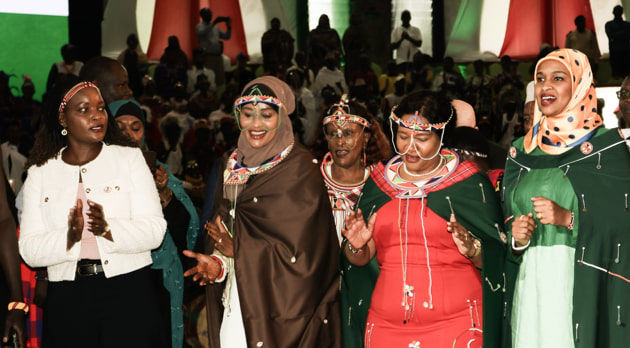STATEMENT ON THE COMMEMORATION OF INTERNATIONAL MINORITY RIGHTS DAY
The National Gender and Equality Commission (NGEC) joins Kenya and the global community in commemorating the International Minority Rights Day, observed annually on December 18th. This day was established by the United Nations to promote and protect the rights of persons belonging to national, ethnic, religious, and linguistic minorities. On December 18, 2023, His Excellency Dr. William Samoei Ruto, E.G.H., President of the Republic of Kenya, declared this day an annual event to celebrate and advance the rights of minority communities in Kenya.
The 2024 United Nations theme is ‘Embracing Diversity: Ensuring Rights, Fostering Inclusion.’ In Kenya, the celebrations will be marked under the theme “One Kenya for All.”
Kenya has made notable strides in recognizing and addressing the unique challenges faced by marginalized communities[1]. The Constitution of Kenya (2010) provides a strong foundation for protecting the rights of these communities and groups. Article 56 explicitly outlines measures to integrate Marginalized groups into the mainstream, while Article 27 guarantees equality and freedom from discrimination. In addition, the Kenya Vision 2030 development blueprint recognizes inclusion as a cornerstone of national development. Targeted interventions in education, healthcare, and economic empowerment have also been implemented to promote inclusion and equality among these groups. The establishment of the Directorate of Minority Affairs under the Presidency demonstrates a renewed political will to address these disparities.
However, despite these efforts, significant challenges remain. Many marginalized groups in Kenya continue to face systemic discrimination, socio-economic exclusion, inadequate representation in governance and limited access to essential services. In counties such as Turkana and Mandera, for example, the net enrollment rate for primary schools is just 43%, compared to a national average of 91%, according to the Kenya National Bureau of Statistics (KNBS, 2022). The Kenya Integrated Household Budget Survey (KIHBS, 2020) also reports that poverty rates in these counties exceed 65%, compared to the national average of 36.1%. Climate change, technological gaps, and urbanization further exacerbate these disparities, leaving these groups more vulnerable and marginalized.
While the establishment of the Directorate of Minority Affairs is a good step, its success will depend on adequate resourcing, a clearly defined mandate, and collaboration with stakeholders. The absence of a comprehensive legislative and policy framework tailored to the specific needs of marginalized communities hinders the full operationalization of Article 56 and perpetuates systemic inequalities.
As we commemorate this day, the National Gender and Equality Commission calls upon all stakeholders: Government agencies, civil society, development partners, and communities to work collaboratively in fostering an inclusive Kenya. We specifically urge:
- The Government
- Enact a comprehensive policy and legislative framework to address the systemic challenges faced by these communities/groups.
- Enact legislative framework to operationalize Article 100 of the Constitution.
- Strengthen the capacity and resources of the institutions charged with the mandate of Marginalized Communities including the Directorate of Minority Affairs to execute their mandate effectively.
- County Governments: Integrate the needs of marginalized/minority groups into County Integrated Development Plans (CIDPs) and implement localized strategies to address their challenges, including access to education, healthcare, and infrastructure.
- Development Partners: Support programs that amplify the voices of marginalized communities and address gaps in service delivery.
- Private sector: Engage Minority communities by creating job opportunities, supporting cultural initiatives, and ensuring representation in decision-making.
- Citizens: Embrace diversity, challenge stereotypes, and actively advocate for the inclusion of marginalized communities in all spheres of national life.
As we celebrate this day, we also recognize the remarkable resilience and contributions of minority communities across Kenya. Despite the challenges they face, these communities continue to drive local development through traditional knowledge, small-scale agricultural innovations, and ecotourism ventures.
The National Gender and Equality Commission remains committed to advocating for the rights of marginalised communities. We will continue to work with stakeholders to foster an inclusive Kenya where every individual, regardless of ethnicity, religion, or background, is empowered to thrive.
Let us celebrate and embrace the strength of our diversity as we build ‘One Kenya for All.’
Hon. Rehema Jaldesa
Chairperson
National Gender and Equality Commission (NGEC)
[1] Defined under article 260 of the Constitution of Kenya,2010


Comments